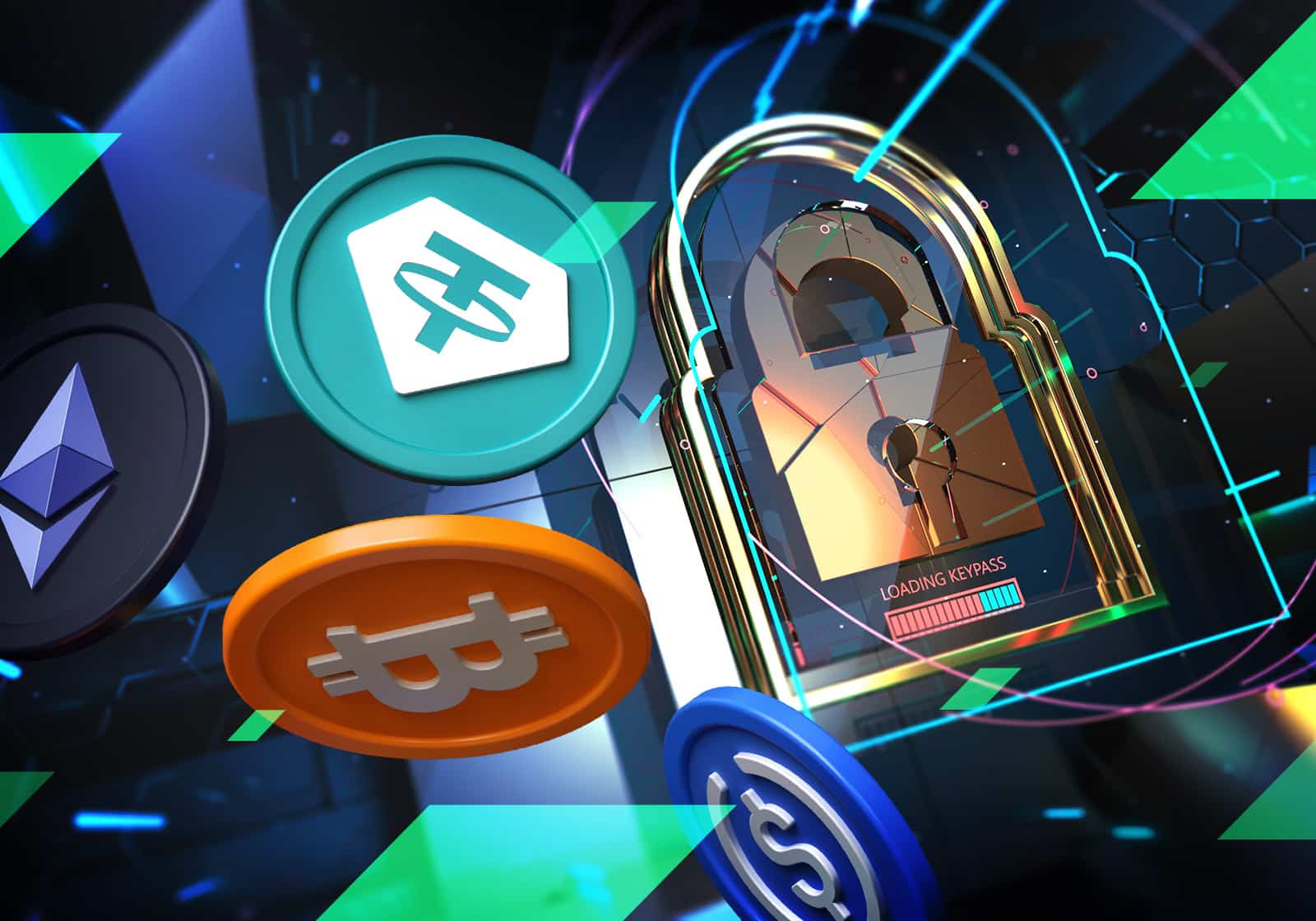How to exchange cryptocurrency and avoid crypto scams

Cryptocurrency has been a buzzword in the financial industry for quite some time now. It offers a world of potential for investors but also comes with its share of risks. Unfortunately, scammers and fraudsters always lurk around, looking for ways to exploit unsuspecting investors. In this article, we discuss the most well-known crypto scams and provide practical advice on how to avoid crypto scams. You can confidently navigate the cryptocurrency world by being aware of crypto scams and taking the necessary steps to protect your investments.
The most common types of scams in crypto
Cryptocurrency has become an increasingly popular investment option over the years, with many individuals seeking to benefit from its high returns. However, with its rise, there has also been an increase in cryptocurrency scams. As a result, it's crucial to be aware of the various methods attackers use. Let's discuss seven types of scams in crypto that you need to know to protect yourself and your assets.

Cryptojacking
Cryptojacking is one of the latest crypto scams where hackers use malware to take control of a victim's computer or smartphone and use its processing power to mine cryptocurrency. This can make the victim's device run slower and use more energy, which could make their bills higher. Meanwhile, the hacker makes money from the cryptocurrency they produce.
How to avoid these types of crypto scams:
- Use antivirus software that you trust and keep it up-to-date.
- Be careful when downloading software or apps from untrustworthy sources.
- Don't click links or download attachments from people or websites you don't know.
Fake ICOs
Initial Coin Offerings (ICOs) are a popular way for new cryptocurrencies to raise funds. While some ICOs are legitimate, others are outright scams. Fake ICOs lure investors in with promises of high returns and innovative technologies. They typically ask investors to buy tokens in the company with Bitcoin or another digital currency. The scammers disappear once the investors transfer their funds, leaving them with worthless tokens.
How to avoid these types of crypto scams:
- Verify that the company and its team members are real.
- Read reviews and feedback from investors.
- Learn about the technology that supports the cryptocurrency.
Fake Wallets and Exchange
Fake wallets and exchanges are created by scammers who make fake websites and apps that look like real wallets or exchanges. Depositing cryptocurrency into these fake wallets or exchanges results in scammers taking it for themselves instead of protecting it for the person. These fake wallets and exchanges are hard to recognise because they frequently use the same logos and branding as legitimate businesses.
How to avoid these types of crypto scams:
- Always double-check that the website address is correct.
- Ensure the company is registered with relevant regulatory bodies before depositing any cryptocurrencies.
Ponzi schemes
Ponzi schemes are not new crypto scams. These classic scams still work remarkably well, even in the digital age. Those running the scheme use money from new investors to pay back earlier ones, but the scheme falls apart when there aren't enough new investors to pay the earlier ones.
How to avoid these types of crypto scams:
- Do your research.
- Check the background of the company or individual offering the investment opportunity.
- Look for reviews from other investors.
Pump-and-Dump Schemes
Pump-and-dump schemes involve the purchase of an asset by bad actors who promote it using false news on social media or online chat forums, driving up its price and then selling it (dump) for a profit. Those who buy based on the hype lose out when the price drops due to the drop in artificial demand.
How to avoid these types of crypto scams:
- It's crucial to research before investing in any new cryptocurrency and be cautious of social media groups or forums that promote specific cryptocurrencies.
- Avoid cryptocurrencies that have had sudden and significant price increases.
Phishing Scams
Phishing scams are recent crypto scams where fraudsters trick people into giving them access to their accounts or personal information. In the crypto world, phishing scams take many forms. For example, a cybercriminal might pretend to be a crypto wallet provider and send users an email or text requesting they change their seed phrase. If you click the link to update your password or seed phrase, you unwittingly reveal your login credentials to the attacker.
How to avoid these types of crypto scams:
- Always double-check the authenticity of the wallet or exchange before sending any cryptocurrency.
- Check the website address, ensure it's spelt correctly, and look for any warning signs such as unprofessional website design, spelling, or grammatical errors.
- Use two-factor authentication (2FA) to add an extra layer of security to your cryptocurrency wallet or exchange account.
Rug Pull
A "rug pull" is a term used to describe a cryptocurrency scam in which an individual convinces people to invest in a project, takes all the money, and disappears before completing the project. The Squid Coin scam is a prime example of a rug pull. In this fraudulent scheme, investors were required to play online games to earn cryptocurrency. The value of Squid tokens increased rapidly, but trading eventually ceased, and the scammers vanished with investors' funds.
How to avoid these types of crypto scams:
- Investigate the individuals involved and verify the number of coins major wallets hold using a blockchain explorer.
The most well-known crypto scams

It's challenging to discover all crypto scams that have ever occurred. However, you can learn about some of the most famous cases to avoid crypto scams. To help with crypto scams and identify the crypto scams to avoid, we provide several examples of the best-known crypto scams that have taken place in cryptocurrency history.
Bitconnect
Bitconnect, a cryptocurrency platform, has been widely reported as one of the biggest scams in crypto. Users lost a staggering $2.4 billion due to the platform's deceptive promises of high rewards. Users were required to lend value in the form of BCC tokens to the platform and earn a 1% compounded daily interest.
As more users acquired and locked their BCC tokens for high profits, the token's demand skyrocketed, and its value rose to over $400, making BCC a top twenty token by value. Unfortunately, the platform stopped operating in 2018 due to legal issues with US regulators. As a result, the token's value plummeted, reducing its market capitalisation by 92% and leaving users with significant losses.
OneCoin
OneCoin is considered one of the most widely-known crypto scams to date. The project raised and defrauded users of an estimated $4 to $6 billion through Ponzi scheme tactics and multilevel marketing strategies similar to Bitconnect. OneCoin presented itself as a blockchain project, using various blockchain-related talking points to attract victims despite not incorporating any blockchain infrastructure. The supposed cryptocurrency, OneCoin, wasn't even legitimate. OneCoin sold plagiarised cryptocurrency courses for over 100,000 Euros, promising freshly mined OneCoin tokens in return. However, the project claimed to have mining facilities in various countries, but no actual mining occurred. OneCoin wasn't listed on any exchange because it wasn't a real cryptocurrency. Instead, it was only available on the project's platform, preventing users from withdrawing funds.
QuadrigaCX
QuadrigaCX is one of the most famous examples of crypto exchange scams. It was once a popular centralised exchange that experienced a downfall. The Canadian platform gained immense popularity in 2017 when Bitcoin's price surged to $20,000, leading to high trade volumes. However, as cryptocurrency prices fell, users noticed red flags since their withdrawal requests weren't honoured.
In January 2019, the situation worsened when the exchange announced that its founder, Gerald Cotten, had passed away. Unfortunately, users couldn't retrieve their funds because the keys to the exchange's cold wallets were inaccessible on their laptops. This left $190 million in user funds trapped forever.
How to avoid crypto scams

If you currently use cryptocurrency and have it stored in an exchange, it's highly recommended that you transfer it to your wallet. This will ensure that you won't fall victim to such incidents in the event of an exchange bankruptcy or a cryptocurrency hack. However, it's important to remember that storing your digital currency in your wallet requires you to keep your keys secure and your wallet stored safely.
Despite storing cryptocurrency in your wallet, scammers can still gain access to your digital assets through various methods, including tricking unsuspecting victims into voluntarily transferring their cryptocurrency to another wallet. Unfortunately, recovering the digital currency is often impossible once a transaction is made. Attackers tend to prefer cryptocurrency over standard currency, as it requires fewer movements to several bank accounts, making it harder for victims to regain access to their money.
To avoid falling prey to crypto scams, you can protect yourself in four ways:
- Be wary of anyone who demands cryptocurrency as payment. Legitimate vendors will offer various payment options, including cryptocurrency, but standard credit card and bank payment options should be available.
- Avoid promises of big returns in exchange for cryptocurrency deposits. Scammers often excite specific coins and trick people into buying digital assets, promising significant returns on investment. However, the currency may later drop in value, and the victim loses money.
- It's important to refrain from taking investment advice from anyone on a dating website. Scammers often use "pig butchering", which allows them to steal thousands of dollars from a single target. They may even try to get you to download trading apps or offer investment advice, so avoiding such offers is best.
- Never disclose your wallet keys to a third party. Your wallet keys should be kept secure, just like your banking password. Keep them safe and never enter them into a strange site, especially any site sent as a link in an email. Phishing scams are often used to steal keys, so it's important to be aware of such tactics. Third-party websites that work with cryptocurrency payments can use bot detection strategies to stop automated attacks against user exchange accounts, so keeping your keys safe is essential.
StormGain is a secure cryptocurrency exchange platform
StormGain does everything it can to keep you from falling victim to a crypto exchange scam.
Safeguarding our users' funds and personal information is a top priority. We employ cutting-edge security measures, including two-factor authentication (2FA), to prevent crypto scammer guys from gaining unauthorised access to accounts. For users who wish to make a withdrawal, multiple signatures are required, and at least two signatures must be added by default to complete the process.
At the data level, we utilise SSL encryption to protect users' data and guarantee secure transmissions between their devices and our servers.
We also comply with the Payment Card Industry Data Security Standard (PCI DSS) and the General Data Protection Regulation (GDPR), ensuring the safety of users' financial and personal information safety.
To facilitate quick trading access, we use a combination of cold and hot wallets to store digital funds, while large amounts of tokens are stored locally for safekeeping.
With our powerful security measures, StormGain provides peace of mind for users, knowing that their funds and personal information are safe and secure.
Conclusion
The high-profile crypto scams have provided valuable lessons for all users in the crypto industry. Conducting adequate due diligence and research before investing in any project is essential to avoid falling prey to fraudulent schemes. Paying attention to the red flags associated with fraudulent platforms, testimonies of other users, the community's perception of the project, and the founders' history is crucial. Knowing the founders' reputations could be a saving grace and help avoid significant losses. Taking these precautions can safeguard your investments and contribute to the crypto industry's growth and development.
Tags
Try our Bitcoin Cloud Miner and get additional crypto rewards based on your trading volume. It's immediately available upon registration.
Try our Bitcoin Cloud Miner and get additional crypto rewards based on your trading volume. It's immediately available upon registration.



